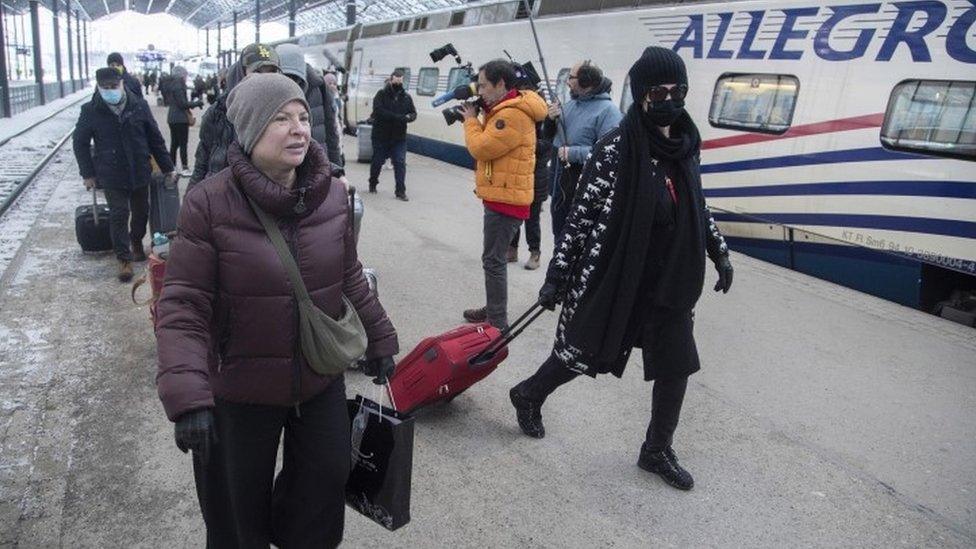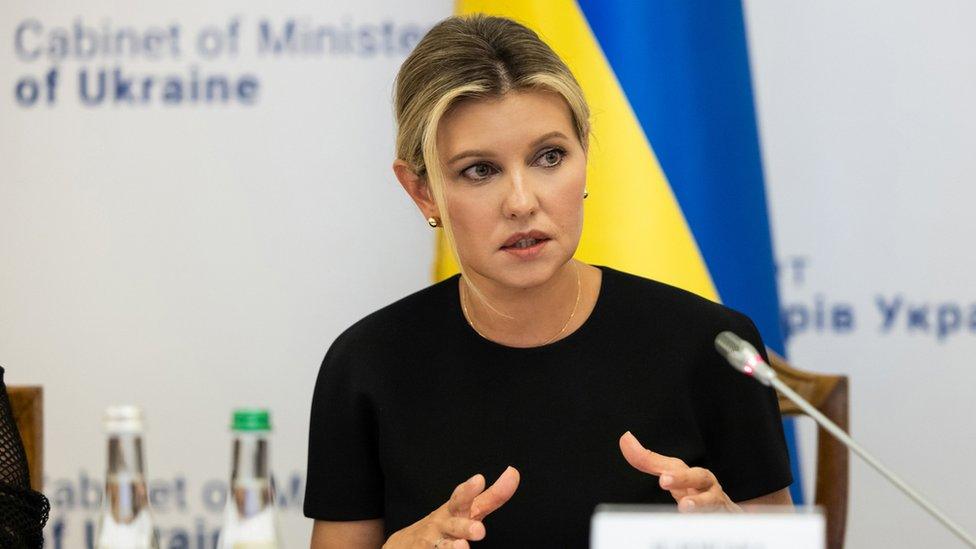Ukraine conflict: Your guide to understanding day 14
- Published
WATCH: The aftermath of a Russia strike on a maternity and children's hospital in Mariupol.
On day 14 of the war in Ukraine, as civilians fled towns and cities around the country, an air strike hit a maternity hospital in Mariupol.
The attack - which Ukraine blames on Russia - has been condemned around the world.
Ukraine's President Volodymyr Zelensky posted footage showing burnt out cars, blown out windows and a deep crater in the ground outside.
Officials say at least 17 people were injured - staff and patients.
"We don't understand how it is possible in modern life to bomb a children's hospital," the deputy mayor of Mariupol, Serhiy Orlov, told the BBC.
Elsewhere, convoys of civilians were waiting to leave several towns near the Ukrainian capital, Kyiv.
In eastern Ukraine, some people did manage to escape from the city of Sumy; others were blocked as negotiations and fighting continued.
Read more: Russian air strike hits Ukraine maternity hospital


Chernobyl loses electricity
Almost two weeks after Russian forces seized the former nuclear power plant Chernobyl, the power has gone out.
Ukrainian authorities - who blamed the Russian troops for the outage - have suggested the situation could become dangerous, as the plant still requires constant management, decades after it became the site of the world's worst nuclear accident.
The head of the UN nuclear watchdog has said the power cut has not affected safety as the spent nuclear fuel left on site could not heat up enough to cause an accident.
The BBC's science correspondent, Pallab Ghosh, has taken a closer look at why experts say there isn't much reason to panic.

West fears Russia could use non-conventional weapons
Western officials have said they are "very concerned" about the risk of escalation in the war between Russia and Ukraine - particularly when it comes to the possibility of Moscow using non-conventional weapons.
This most likely refers to chemical weapons although the term also covers tactical (small-scale) nuclear weapons, biological weapons and dirty bombs.
They said this was partly because of what had been seen in other places where Russia has been engaged in conflict, notably Syria where chemical weapons were used by its allies.
The BBC's security correspondent, Gordon Corera, takes a closer look.

The Russians thinking of running

Thousands of Russians are leaving the country, including these arriving by train in Helsinki
More than two million Ukrainians have already fled the invasion which engulfed their country just two weeks ago.
But in Russia, tens of thousands are also fleeing - some scared for their futures in a country cut off from the wider world, others frightened by the prospect of life under a more repressive regime.
In Moscow, Lydia is considering becoming the third generation in her family to escape Russia, following in the steps of her grandfather - who ran from Stalin - and his father before him - who fled the anti-Jewish pogroms.
Money may be playing a huge part in her deliberations, but there is something else as well: shame.
"I think it's going to take me and most of my friends years, before I can say I'm Russian and not feel ashamed," she tells the BBC.

Ukraine's first lady speaks out

Olena Zelenska is a familiar figure on the world stage
Olena Zelenska - a screenwriter before she became Ukraine's first lady - has said the Russian invasion amounts to the same as the "mass murder" of her country's civilians.
In a letter, published on the president's website, she described the deaths of children as "the most terrifying and devastating" part of the invasion, mentioning the names of three who had been killed since Moscow launched its attack two weeks ago.

War in Ukraine: More coverage
OCCUPIED CITY: 'We are not co-operating'
RUSSIA MOTHERS: 'How do I get my soldier son back?'
EXPLAINED: Why Putin has invaded Ukraine?
IN DEPTH: Full coverage of the conflict
